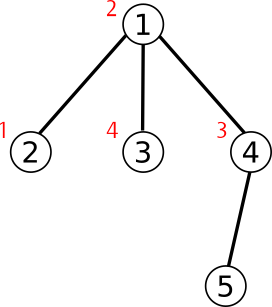| Codeforces Round 326 (Div. 2) |
|---|
| Finished |
Recently Duff has been a soldier in the army. Malek is her commander.
Their country, Andarz Gu has n cities (numbered from 1 to n) and n - 1 bidirectional roads. Each road connects two different cities. There exist a unique path between any two cities.
There are also m people living in Andarz Gu (numbered from 1 to m). Each person has and ID number. ID number of i - th person is i and he/she lives in city number ci. Note that there may be more than one person in a city, also there may be no people living in the city.

Malek loves to order. That's why he asks Duff to answer to q queries. In each query, he gives her numbers v, u and a.
To answer a query:
Assume there are x people living in the cities lying on the path from city v to city u. Assume these people's IDs are p1, p2, ..., px in increasing order.
If k = min(x, a), then Duff should tell Malek numbers k, p1, p2, ..., pk in this order. In the other words, Malek wants to know a minimums on that path (or less, if there are less than a people).
Duff is very busy at the moment, so she asked you to help her and answer the queries.
The first line of input contains three integers, n, m and q (1 ≤ n, m, q ≤ 105).
The next n - 1 lines contain the roads. Each line contains two integers v and u, endpoints of a road (1 ≤ v, u ≤ n, v ≠ u).
Next line contains m integers c1, c2, ..., cm separated by spaces (1 ≤ ci ≤ n for each 1 ≤ i ≤ m).
Next q lines contain the queries. Each of them contains three integers, v, u and a (1 ≤ v, u ≤ n and 1 ≤ a ≤ 10).
For each query, print numbers k, p1, p2, ..., pk separated by spaces in one line.
5 4 5
1 3
1 2
1 4
4 5
2 1 4 3
4 5 6
1 5 2
5 5 10
2 3 3
5 3 1
1 3
2 2 3
0
3 1 2 4
1 2
Graph of Andarz Gu in the sample case is as follows (ID of people in each city are written next to them):

| Name |
|---|




